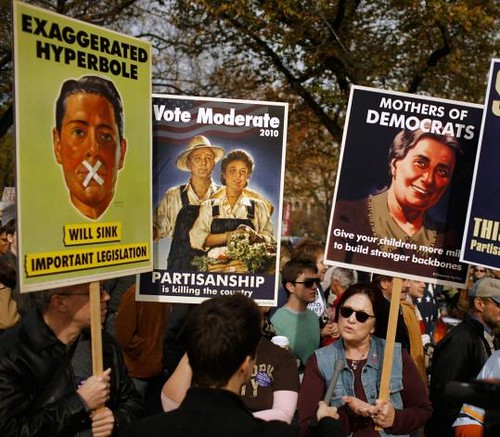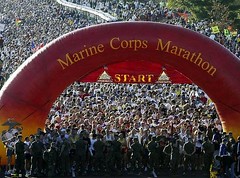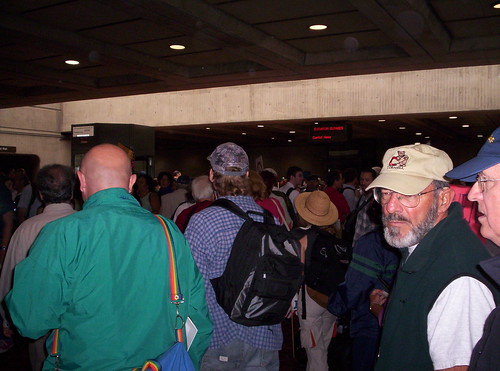A broken record on transportation demand management planning, this time with regard to special events
Even I bore myself mentioning all the time the necessity of master transportation demand management planning in DC. And I have mentioned it from time to time with regard to events planning and staging, including the provision of bike parking and valets at events, as is done by the Washington Area Bicyclist Assoication.
Special events in DC, closing DC streets, involve the Mayor's Special Events Task Force, coordinated by the Department of Emergency Management and Homeland Security, and events on the National Mall require a permit from the National Park Service.
I have commented from time to time here and on Washcycle, that the event approval process inadequately covers what we might call transportation demand management requirements, especially with regard to bicycling.
But this past weekend's events, contrasting how WMATA handled the provision of subway service in the context of the Stewart/Colbert "National Sanity" political rally on Saturday (BAD, REALLY BAD, versus the handling of the Marine Corps Marathon on Sunday (GOOD) illustrates that the problem is more global and not limited to consideration of the needs of bicyclists. See the comment thread in this entry from GGW and "Did Metro Fail Saturday" from the Post.

Attendees of the Rally to Restore Sanity And/Or Fear in Washington, D.C., hosted by Comedy Central comedians Jon Stewart and Stephen Colbert, carried signs at the National Mall. (Chip Somodevilla/ Getty Images)
Yes, WMATA handled the Sunday event better because they planned for it, and have had decades of experience in dealing with the Marine Corps Marathon, which occurs every year. No, WMATA didn't handle the Saturday event very well because they had maintenance scheduled on the red line in particular which created bottlenecks, the event organizers didn't plan for transportation impact and weren't willing to pay for extra service, and the forecast of the number of attendees was probably 1/2 of the actual attendance. (Although, to give some slack to WMATA, it was a record day for ridership, on a Saturday when many of the lines ran fewer than the normal complement of trains.)

Start, Marine Corps Marathon, 2010. Photographer unknown.
It does demonstrate that Transportation Demand Management needs to be built into event planning and staging, especially for events on the National Mall, but also for other events held within the city, under the jurisdiction of DC.
By their very nature, political rallies are ad-hoc and one time events, and the presenters can't be expected to handle transportation planning all that well. And because people come from all over, it's hard to get information out to the right people in advance.
Still, WMATA, the NPS, NCPC, and other entities could work with event presenters and the national motorcoach bus trade association as well as state motorcoach associations to direct buses to the WMATA subway line end points convenient to freeways such as Vienna, Greenbelt, Springfield, and New Carrollton (some buses could be directed to Springfield and some to New Carrollton, by working in advance with the event organizers and the Motorcoach associations), with back up parking space off site so that buses can drop off passengers at the stations and then move off site, freeing up parking lots for more drop off staging.
Traveling to BWI to go to a conference in 2005, I once experienced the Greenbelt subway station during a national rally, this one protesting the Iraq War, and I learned first hand what a chaotic situation the endpoint stations are before (and presumably after) a rally, because people have to get Metrocards, and people don't know how to use the transit system, and WMATA typically doesn't increase the number of staff people on hand at the stations, so the normal personnel get crushed.

Anti-war protestors mobbing the Greenbelt subway station, September 24, 2005.
I know that there were a lot of planning efforts to deal with the Obama Inauguration. Some of those efforts need to be dusted off and reformed into a standard protocol for all such massive events.
A big problem with "casual" users of the subway system is that they have to buy Metrocards and this becomes a zoo.
But working with the Motorcoach Association and event organizers, WMATA could sell $10 paper Metrocards in advance, "per bus," say in packs of 55 (typically a motorcoach seats 55 people), so that all of the people on a particular bus have Metrocards in advance and they don't have to stop at the farecard machines.
But at the same time, DC and the National Park Service and other agencies need to step back and review the event approval process, and integrate into the process transportation demand management protocols, and a requirement to pay for extra subway service, if it is deemed necessary, in order for permits to be granted.
Planning for transportation and paying for it if necessary shouldn't be an option for event organizers, it should be a requirement.
And maybe WMATA, DC, etc. could develop a volunteer corp of "transit ambassadors" to provide additional assistance during events such as these, to make people's experience and journey more efficient even if it can't be more comfortable.
Labels: transportation demand management



0 Comments:
Post a Comment
<< Home